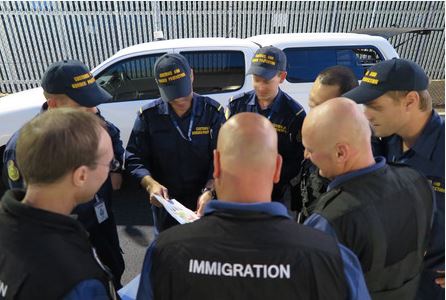The main public service union has accused the Department of Immigration and Border Protection (DIBP) of “massively overstating” a national security threat from foreign fighters, sex offenders and drug traffickers to prevent its staff from striking until July 2.
The Fair Work Commission issued an interim order yesterday (Monday) to suspend all protected industrial action (PIA) by union members of the DIBP, including the Australian Border Force (ABF), at airports and ports after the Department argued it posed a risk to national security.
The DIBP said: “There is real risk that over time the industrial action will affect the capacity of the Australian Border Force (ABF) to protect Australia’s border, increasing the likelihood of drug traffickers, child sex offenders, other criminals and persons who are national security risks (such as returning foreign fighters), or harmful and illicit goods in cargo, getting into the country undetected.
“These risks, plus the rapidly diminishing ability of the ABF to plug the gaps caused by this round of industrial action, are of immediate concern to the ABF Commissioner, who had no sensible alternative but to legally seek a halt to the action being taken.”
But Community and Public Sector Union (CPSU) Secretary Nadine Flood said she had proof that the Department was hamming it up to stymie the strikes, which have been intermittent for the last 10 months and are in response to two years of failed negotiations under the public sector bargaining process.
Ms Flood said a document sent by the DIBP to senior staff but not made public, backed up the Union’s claim.
The DIBP document said: “It is well understood, from the Prime Minister down, that national security is not under threat at airports.
“While airports are generally targets for a terrorist attack because they, like all transit hubs, are places of mass gathering, we think that PIA in its current form does not make airports a more attractive target for an attack like the one recently occurring in Brussels.”
The Union had already agreed to postpone industrial action at Australia’s airports over the Easter long weekend after a direct appeal from Prime Minister Malcolm Turnbull, following the Brussels terrorist attacks, which included bombs at Zaventem Airport.
Ms Flood said the strike action had always exempted officers involved with counter-terrorism and security.
“Our members working in Immigration and Border Force never have and never will act in any way that would compromise national security.
“We are fighting this case because the Department’s demand to suspend all industrial action is unreasonable and this disadvantages these workers significantly, when there is not in fact the risk to national security they are suggesting.”
Ms Flood also attacked the Fair Work Commission process, saying the Department had been “incredibly secret” about its reasons for seeking the suspension of industrial action, seeking orders to suppress evidence and binding the union to secrecy. Hearings took place on Friday night, Saturday and Sunday.
But the DIBP hit back, insisting that it had “not sought to capriciously remove the right of employees to participate in PIA.”
“However the current action poses an unacceptable risk to the community and this is why we have sought suspension. We have not taken this decision lightly and are committed to bargaining in good faith – within the parameters of the Government’s bargaining policy – to achieve the best possible outcome for our workforce.”
The FWC approved the Union’s application to delay the final hearing – which was scheduled today (Tuesday) – until Thursday this week, to give it more time to assess whether the DIBP’s reasons to oppose industrial action were genuine and sufficiently evidence-based.
The strikes are in response to the glacially slow process to get public sector enterprise bargaining agreements signed. The row over pay and conditions remains intense and the Union has estimated that around 80 per cent of Commonwealth public servants or about 120,000 people are still without an agreement after almost two years.






Leave a Reply